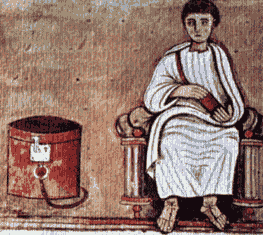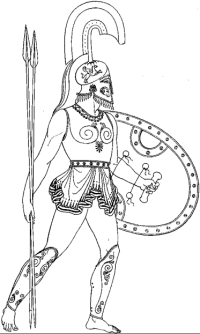Virgil
The Georgics
 Virgil's
first full-scale poem - four books ostensibly about farming, which he wrote during
the terrible civil war following the murder of Julius Caesar. Although
Virgil's family had suffered during the fighting, he is supposed to have
presented the completed Georgics (which he'd worked on at approximately
a line a day) to the victorious Octavian. Its predominant theme shows
agriculture as a metaphor for politics. Jupiter deliberately made life
hard for man, so that he could redeem himself through hard work.
Virgil's
first full-scale poem - four books ostensibly about farming, which he wrote during
the terrible civil war following the murder of Julius Caesar. Although
Virgil's family had suffered during the fighting, he is supposed to have
presented the completed Georgics (which he'd worked on at approximately
a line a day) to the victorious Octavian. Its predominant theme shows
agriculture as a metaphor for politics. Jupiter deliberately made life
hard for man, so that he could redeem himself through hard work.
The Aeneid
 Virgil's mighty epic in 12 books, which occupied the rest of his life.
It was commissioned by Augustus, through his minister Maecenas. His ambition
was no less than to fill for Roman civilisation and culture the role that
Homer - half Bible half Shakespeare - filled for the Greeks. The first
half mirrors the Odyssey - Aeneas struggles to return home from Troy:
the second half is Virgil's Iliad - a series of battles between Aeneas
and the Italians, culminating in the defeat and cold-blooded killing of
their attractive champion, Turnus. Rome has no place for an Achilles figure:
Aeneas is preoccupied by duty - to the gods, his father, and his destiny:
a new-found home in the west. Those ruled by passion - like Turnus, and
earlier, Dido must be sacrificed so that the new state may prevail. So
the ruthless Augustus triumphed over his enemies. But we are never sure
how committed Virgil is to the view that this is actually a good thing
for the human race!
Virgil's mighty epic in 12 books, which occupied the rest of his life.
It was commissioned by Augustus, through his minister Maecenas. His ambition
was no less than to fill for Roman civilisation and culture the role that
Homer - half Bible half Shakespeare - filled for the Greeks. The first
half mirrors the Odyssey - Aeneas struggles to return home from Troy:
the second half is Virgil's Iliad - a series of battles between Aeneas
and the Italians, culminating in the defeat and cold-blooded killing of
their attractive champion, Turnus. Rome has no place for an Achilles figure:
Aeneas is preoccupied by duty - to the gods, his father, and his destiny:
a new-found home in the west. Those ruled by passion - like Turnus, and
earlier, Dido must be sacrificed so that the new state may prevail. So
the ruthless Augustus triumphed over his enemies. But we are never sure
how committed Virgil is to the view that this is actually a good thing
for the human race!

